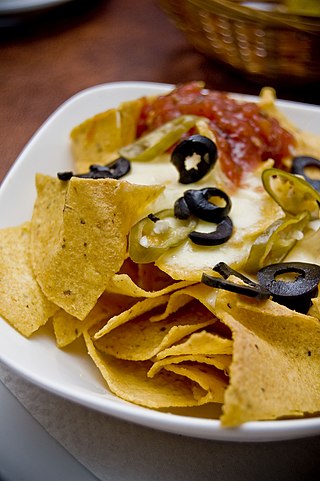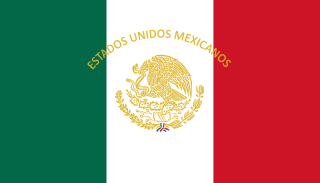Related Research Articles

Mexico City is the capital and largest city of Mexico, and the most populous city in North America. It is one of the most important cultural and financial centers in the world. Mexico City is located in the Valley of Mexico within the high Mexican central plateau, at an altitude of 2,240 meters (7,350 ft). The city has 16 boroughs or demarcaciones territoriales, which are in turn divided into neighborhoods or colonias.

Mexican cuisine consists of the cooking cuisines and traditions of the modern country of Mexico. Its earliest roots lie in Mesoamerican cuisine. Mexican cuisine ingredients and methods begin with the first agricultural communities such as the Olmec and Maya who domesticated maize, created the standard process of nixtamalization, and established their foodways. Successive waves of other Mesoamerican groups brought with them their cooking methods. These included: the Teotihuacanos, Toltec, Huastec, Zapotec, Mixtec, Otomi, Purépecha, Totonac, Mazatec, Mazahua, and Nahua. With the Mexica formation of the multi-ethnic Triple Alliance, culinary foodways became infused.

New Mexico is a state in the Southwestern region of the United States. It is one of the Mountain States of the southern Rocky Mountains, sharing the Four Corners region with Utah, Colorado, and Arizona. It also borders the state of Texas to the east and southeast, Oklahoma to the northeast, and shares an international border with the Mexican states of Chihuahua and Sonora to the south. New Mexico's largest city is Albuquerque, and its state capital is Santa Fe, the oldest state capital in the U.S., founded in 1610 as the government seat of Nuevo México in New Spain.

A taco is a traditional Mexican dish consisting of a small hand-sized corn- or wheat-based tortilla topped with a filling. The tortilla is then folded around the filling and eaten by hand. A taco can be made with a variety of fillings, including beef, pork, chicken, seafood, beans, vegetables, and cheese, and garnished with various condiments, such as salsa, guacamole, or sour cream, and vegetables, such as lettuce, coriander, onion, tomatoes, and chiles. Tacos are a common form of antojitos, or Mexican street food, which have spread around the world.

Albuquerque, also known as ABQ, Burque, the Duke City, and in the past 'the Q', is the most populous city in the U.S. state of New Mexico. Founded in 1706 as La Villa de Alburquerque by Santa Fe de Nuevo México governor Francisco Cuervo y Valdés, and named in honor of Francisco Fernández de la Cueva, 10th Duke of Alburquerque and Viceroy of New Spain, it served as an outpost on El Camino Real linking Mexico City to the northernmost territories of New Spain.

Mexico City International Airport ; officially Aeropuerto Internacional Benito Juárez is the primary international airport serving Greater Mexico City. It is the busiest airport in Mexico and Latin America, ranking as the 17th-busiest in the world and eighth in North America as of 2022, based on passenger traffic and aircraft movements.

Tamaulipas, officially the Free and Sovereign State of Tamaulipas, is a state in Mexico; one of the 31 states which, along with Mexico City, comprise the 32 federal entities of Mexico. It is divided into 43 municipalities.

The governor of New Mexico is the head of government of New Mexico. The governor is the head of the executive branch of New Mexico's state government and the commander-in-chief of the New Mexico National Guard. As noted in the governor's seal, this gubernatorial office is a scion of the Spanish and Mexican governors of Nuevo México (1598) and the governors of the New Mexico Territory (1851). The officeholder is afforded the courtesy title of The Honorable for life. The current governor is Michelle Lujan Grisham, a Democrat, who was sworn in as the 32nd governor of New Mexico on January 1, 2019.

Nachos are a Tex-Mex culinary dish consisting of tortilla chips or totopos covered with cheese or cheese sauce, as well as a variety of other toppings and garnishes, often including meats, vegetables, and condiments such as salsa, guacamole, or sour cream. At its most basic form, nachos may consist of merely chips covered with cheese, and served as an appetizer or snack, while other versions are substantial enough to serve as a main course. The dish was created by, and named after, Mexican restaurateur Ignacio "Nacho" Anaya, who created it in 1943 for American customers at the Victory Club restaurant in Piedras Negras, Coahuila.

Salsa encompasses a variety of sauces used as condiments for tacos and other Mexican and Mexican-American foods, and as dips for tortilla chips. They may be raw or cooked, and are generally served at room temperature.

A quesadilla is a Mexican dish consisting of a tortilla that is filled primarily with cheese, and sometimes meats, spices, and other fillings, and then cooked on a griddle or stove. Traditionally, a corn tortilla is used, but it can also be made with a flour tortilla.

Pozole is a traditional soup or stew from Mexican cuisine. It is made from hominy with meat, and can be seasoned and garnished with shredded lettuce or cabbage, chili peppers, onion, garlic, radishes, avocado, salsa or limes. Known in Mesoamerica since the pre-Columbian era, the stew is common across Mexico and neighboring countries, served both as a day-to-day meal and as a festive dish.

New Mexican cuisine is the cuisine of the Southwestern US state of New Mexico. It is known for its fusion of Pueblo Native American cuisine with Hispano Spanish and Mexican culinary traditions, rooted in the historical region of Nuevo México. This Southwestern culinary style extends it influence beyond the current boundaries of New Mexico, and is found throughout the old territories of Nuevo México and the New Mexico Territory, today the state of Arizona, parts of Texas, and the southern portions of Colorado, Utah, and Nevada.

Mexico, officially the United Mexican States, is a country in the southern portion of North America. Covering 1,972,550 km2, it is the world's 13th largest country by area; with a population of over 130 million, it is the 10th most populous country and has the most Spanish speakers in the world. Mexico is a constitutional republic comprising 31 states and Mexico City, its capital and largest city, which is among the world's most populous metropolitan areas. The country borders the United States to the north; as well as Guatemala and Belize to the southeast. It has maritime borders with the Pacific Ocean to the west, the Caribbean Sea to the southeast, and the Gulf of Mexico to the east.

Birria is a meat stew or soup, mainly made with goat or beef. The meat is marinated in an adobo made of vinegar, dried chiles, garlic, and herbs and spices before being cooked in a broth. Historically, birria was the regional name given in the state of Jalisco and surrounding areas to meats cooked or roasted in a pit or earth oven, what is known as barbacoa in other regions of Mexico, although for many people today, mostly in the United States, birria is now a distinct dish.

Santa Fe is the capital of the U.S. state of New Mexico, and the county seat of Santa Fe County. With over 89,000 residents, Santa Fe is the fourth-most populous city in the state, and part of the Albuquerque–Santa Fe–Los Alamos combined statistical area, which had a population of 1,162,523 in 2020. Situated at the foothills of the Sangre de Cristo Mountains, the city is at the highest altitude of any U.S. state capital, with an elevation of 6,998 feet.

Tejuino is a cold fermented beverage made from corn and popularly consumed in the Mexican states of Jalisco, Colima, Nayarit and Oaxaca. Tejuino is usually made from corn dough, the same kind used for tortillas and tamales. The dough is mixed with water and piloncillo and boiled until the liquid is very thick. The liquid is then allowed to ferment very slightly. The resulting drink is generally served cold, with lime juice, a pinch of salt and a scoop of shaved ice or lime sorbet.

The president of Mexico, officially the president of the United Mexican States, is the head of state and head of government of Mexico. Under the Constitution of Mexico, the president heads the executive branch of the federal government and is the commander in chief of the Mexican Armed Forces. The office, which was first established by the federal Constitution of 1824, is currently held by Claudia Sheinbaum, who was sworn-in on October 1, 2024. The office of the president is considered to be revolutionary, in the sense that the powers of office are derived from the Revolutionary Constitution of 1917. Another legacy of the Mexican Revolution is the Constitution's ban on re-election. Mexican presidents are limited to a single six-year term, called a sexenio. No one who has held the post, even on a caretaker basis, is allowed to run or serve again. The constitution and the office of the president closely follow the presidential system of government.

Mole, meaning 'sauce', is a traditional sauce and marinade originally used in Mexican cuisine. In contemporary Mexico the term is used for a number of sauces, some quite dissimilar, including mole amarillo or amarillito, mole chichilo, mole colorado or coloradito, mole manchamantel or manchamanteles, mole negro, mole rojo, mole verde, mole poblano, mole almendrado, mole michoacano, mole prieto, mole ranchero, mole tamaulipeco, mole xiqueno, pipián, mole rosa, mole blanco, mole estofado, tezmole, clemole, mole de olla, chimole, guacamole and huaxmole.
Roberto Córdova was a Mexican jurist, international judge, and diplomat. Córdova served as a judge for the International Court of Justice (ICJ) between 1955 and 1964. He was the second Mexican to serve as an ICJ judge, following Isidro Fabela.
References
- ↑ "Perfil del legislador". Legislative Information System. Retrieved 16 April 2015.